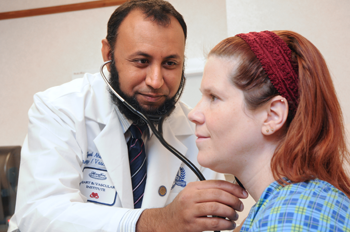Vascular Medicine
Vascular medicine is an emerging field that focuses on specialized diagnosis and treatment of vascular diseases outside of the heart.
If you’ve been diagnosed with a vascular disease or circulatory disease, you may not know what this means. When people hear the word “vascular,” they often think of heart issues, given the wide use of the term, “cardiovascular.”
However, while cardiologists focus on heart conditions, vascular medicine specialists focus on all other diseases that affect your arteries, veins and lymph vessels. Vascular disease causes more illnesses and deaths than heart disease, yet it often goes undetected and untreated.
World-class expertise
At Henry Ford Heart & Vascular, we offer specialized treatment from expert physicians who have extensive vascular medicine training and experience. It is important to identify vascular problems early on before they cause a sudden life-threatening event, such as a stroke or loss of a limb. Increasingly, early diagnosis and treatment of vascular disease is recognized as an important component of excellent cardiovascular care.
How Do I Know if I Have Venous Disease?

What is vascular medicine?
Vascular medicine specialists focus on the diagnosis and nonsurgical treatment of vascular conditions, including:
- Arterial disease: Arteries carry blood from the heart to the rest of the body. Conditions we treat include aortic aneurysms and dissections, carotid artery stenosis, peripheral artery disease, Raynaud’s disease, renal artery stenosis and subclavian steal syndrome.
- Venous disease: Veins carry blood back to the heart. Conditions we treat include chronic venous insufficiency, pelvic congestion syndrome, thrombophlebitis, venous thromboembolism (deep vein thrombosis and pulmonary embolism) and non-healing wounds (including ulcers of the hands and feet).
- Varicose veins: While this is a type of venous disease, people often think that this is a cosmetic issue only. However, if you experience symptoms that worsen, complications may arise, including deep vein thrombosis. Our vascular medicine specialists can treat both varicose veins and spider veins (a related condition).
- Vein compression syndromes: When major veins are compressed by nearby structures, it can reduce blood flow or cause a blood clot. Some of the syndromes we diagnose and treat include Klippel-Trenaunay-Weber syndrome, May-Thurner syndrome, Nutcracker syndrome and Paget-Schroetter syndrome (a type of thoracic outlet syndrome).
- Swelling or Lymphedema: The lymphatic system is composed of vessels, organs and other tissues. It carries lymphatic fluid throughout the body, helping to get rid of waste and other toxins. When there is a blockage in this system, it can cause lymphedema, or a fluid buildup in the fatty tissue under your skin. The swelling usually affects the arms or legs but also can affect other parts of the body, and it is a common side effect of cancer treatment.
Related Topic: Edema And Vascular Health: 10 Tips For Avoiding Water Retention
Related Topic: Lymphedema and Chronic Vein Insufficiency: What’s The Difference?
Diagnosing and treating vascular disease
As part of our integrated, multidisciplinary vascular medicine program, we offer specialized vascular care for the treatment of arterial, venous and lymphatic conditions, along with the full range of diagnostic testing, including ultrasound, CT and MRI screening, and noninvasive flow studies (NIFS).
Vascular medicine specialists perform nonsurgical procedures when necessary. When vascular surgery is necessary, you’ll find an expert team of surgeons who are pioneers in innovative treatments.
Patient Stories
Our vascular medicine patients share their experiences.
Char’s Story
Char thought there was a real possibility her toes might be amputated due to little circulation in either leg. Thanks to her care team, circulation was restored and Char enjoys getting back into real shoes again. Explore Char's Story >
Rob’s Story
Rob was diagnosed with lymphedema – his legs were so swollen his pant legs and shoes didn’t fit properly. After meeting with Dr. Ahsan, they worked together to find out why his legs were swelling and how to help him lose weight. Rob lost over 200 pounds and now has a much more active lifestyle. Explore Robert's Story >
.svg?iar=0&hash=F6049510E33E4E6D8196C26CCC0A64A4)

/hfh-logo-main--white.svg?iar=0&hash=ED491CBFADFB7670FAE94559C98D7798)

